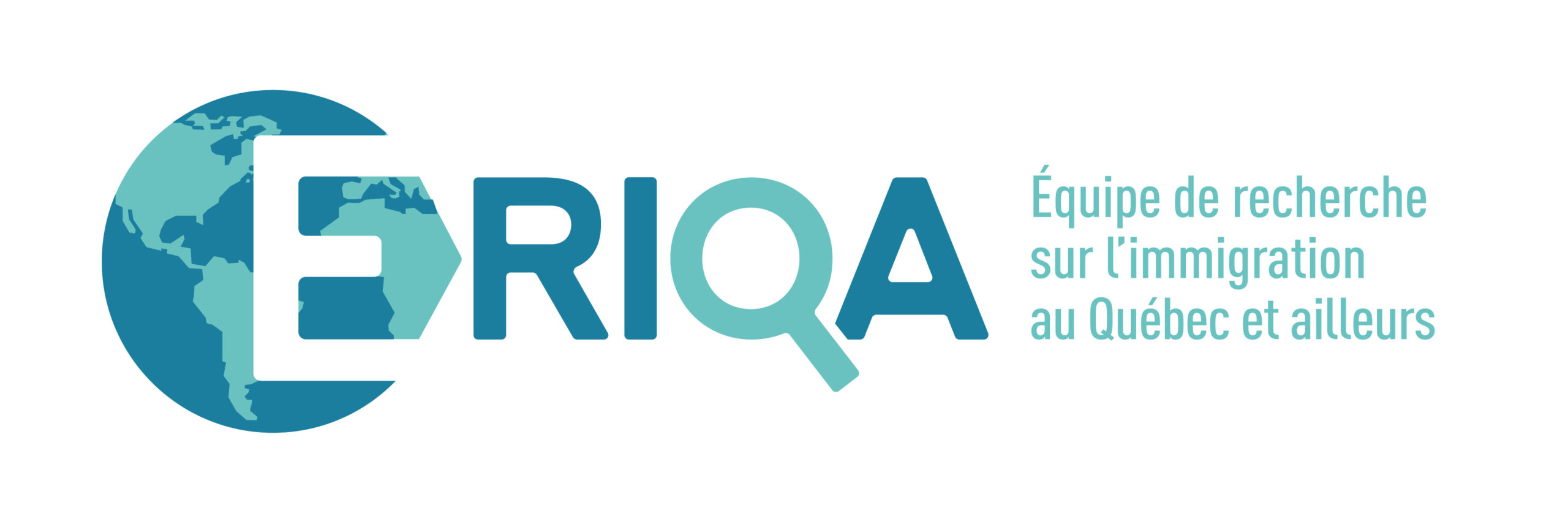Tant de sujets passionnants à découvrir à travers les dernières publications des membres de l’ÉRIQA. Petit coup de projecteur sur une série d’articles publiés très récemment et qui nous permettent de mieux comprendre les phénomènes migratoires au Québec (ou au Canada). Tous les articles publiés par l’ÉRIQA sont disponibles sur cette page du site Internet.
Paul EID : Les majorités nationales ont-elles une couleur ? Réflexions sur l’utilité de la catégorie de « blanchité » pour la sociologie du racisme

RÉSUMÉ: J’examine ici la pertinence de la catégorie de « blanchité » pour l’analyse du racisme en Occident. Cette catégorie, travaillée par les Whiteness Studies, a l’avantage de rendre visibles les mécanismes systémiques garantissant aux « BlancHEs » un accès privilégié au pouvoir et aux ressources. Je ferai valoir notamment que les vives résistances suscitées au Québec par la notion de racisme systémique fut un révélateur d’une certaine « fragilité blanche » qui se manifeste, typiquement, lorsque le rôle et les intérêts des « racisantEs » dans la reproduction des rapports sociaux de « race » sont nommés et rendus visibles. Toutefois, aussi utile soit-il pour l’étude du racisme, l’usage sociologique de la notion de blanchité commande certaines précautions, afin de la complexifier et de la dégager des cadres essentialisants à travers lesquels elle est encore trop souvent appréhendée au sein des Whiteness Studies. Je soutiendrai en outre qu’on ne peut penser la blanchité sans réfléchir conjointement au processus de construction de la nation et de ses étrangers intérieurs. Par ailleurs, l’expérience de la blanchité varie en fonction des rapports mutuellement structurants entre la « race » et d’autres facteurs de différenciation sociale (ex. : genre, classe).
Chedly BELKHODJA (avec Guliz Akkaymak) : Does Place Matter? Burial Decisions of Muslims in Canada

ABSTRACT: This paper is concerned with the complex relationship between immigration, religion, burial decisions, and a sense of belonging. Drawing upon a case study of Muslims in London, Ontario, Canada, we examine Islamic funeral and burial services available in the city and the preferred burial locations of its Muslim communities. Our interviews with different immigrant generations of Muslims show that participants, regardless of their immigrant generation, prefer London as a location of burial for themselves and their loved ones. We argue that four major factors at the structural and individual level shape the preference of study participants with respect to the location of burial: access to an Islamic cemetery and Islamic funeral services; an established Muslim population in the city; relation to and interpretation of religious requirements; and a sense of belonging to Canada. We discuss the findings in relation to multiculturalism and recognition of cultural and religious differences.
Antoine BILODEAU (avec Luc Turgeon): Boundaries of the nation(s) in a multinational state: Comparing Quebecers and other Canadians’ perspectives on national identity

ABSTRACT: Drawing on the Canadian case, this study examines whether, in a multinational state, majority and minority nations emphasize different criteria when tracing the borders of their respective national community. It does so by comparing native‐born French speakers in Quebec and native‐born English speakers in the rest of Canada from three different perspectives. We examine (a) the way ascriptive and attainable groupings of characteristics are constructed in Quebec and in the rest of Canada, (b) the importance given to attainable and ascriptive characteristics, and (c) the implications of ascriptive and attainable characteristics for attitudes toward immigration and generalized trust. The findings suggest that majority‐group members in Quebec and in the rest of Canada broadly draw the boundaries of their nation in similar ways and with similar implications.
Catherine XHARDEZ et Mireille PAQUET : Beyond the Usual Suspects and Towards Politicisation: Immigration in Quebec’s Party Manifestos, 1991–2018

ABSTRACT: Immigration is increasingly politicised: issues surrounding immigration are more salient and party immigration positions are becoming more polarised. Literature on this topic has overwhelmingly focused on Europe and the USA, while identifying radical right parties and particular social dynamics as the main drivers of politicisation. In this paper, we consider a case that exhibits growing politicisation, yet does not fit existing measures and explanation of this phenomenon: Quebec, Canada. Considering party manifestos between 1991 and 2018, we ask: how have Quebec major political parties treated immigration policy issues over time? We argue that Quebec’s immigration partisan space is organised by a liberal-restrictive immigration policy continuum and a jurisdictional axis. Mapping provincial political parties’ positions, we document a stable clustering towards liberal policy positions but a clear cleavage on the jurisdictional axis. We show that the emergence in 2012 of a highly moderate centre right party—the Coalition Avenir Québec—broke with these established positions and drove a politicisation of the issue. These results demonstrate the importance of considering alternative drivers to explain the politicisation of immigration, as well as of paying attention to the politics of immigration in contexts where pro-immigration discourses dominate.
Mireille PAQUET et Catherine XHARDEZ: Immigrant integration policies when regions decide ‘who comes in’: the case of Canadian provinces

ABSTRACT: Using the Canadian case, this paper explores immigrant integration policies when Rokkan and non-Rokkan regions have immigrant selection capacities. By systematically documenting integration policies of all Canadian regions and by describing elites’ justifications for such policies between 2010 and 2018, we demonstrate that every region – including Quebec, which has a distinct language and culture – primarily focuses on economic immigrant integration. We show that regional elites justify these policies as part of their regional economic development strategies and that regional immigrant selection capacity is not considered as a cure-all solution for the contemporary challenges facing regions.







